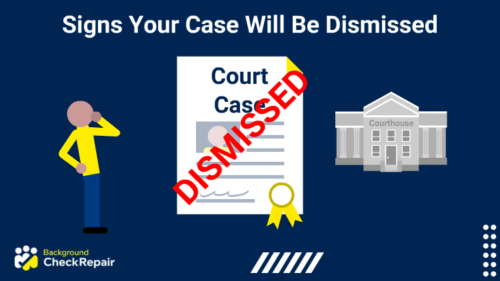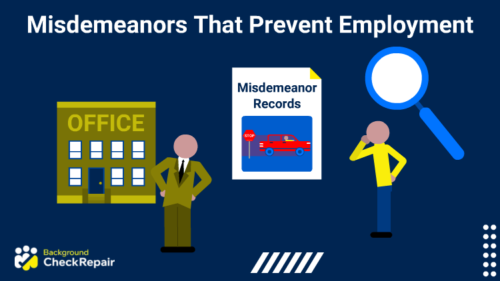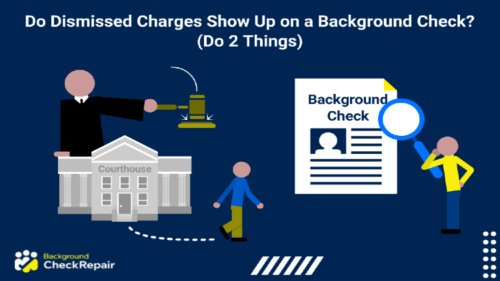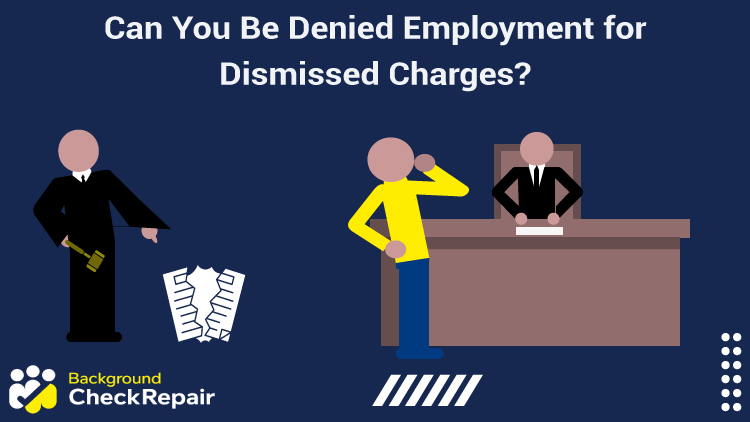
Many individuals applying for jobs that require background checks wonder, can you be denied employment for dismissed charges?
However, the answer is somewhat complicated.
The first thing to do is to run a background check on yourself to ensure that no dismissed charges show up. Background checks are not infallible, and some information may have been entered erroneously.
By checking your background check first, applicants can find out whether dismissed charges show up.
Although there is a good chance a dismissed charge can hurt job chances, in some states, it can be illegal to deny someone employment based on a dismissed charge.
This complete guide outlines the answer to the question, can you be denied employment for dismissed charges, and explains when a dismissed charge may show up on a background check for employment.
Can You Be Denied Employment for Dismissed Charges?
When asking, can you be denied employment for dismissed charges, applicants should know that although it is possible in certain circumstances for an employer to cite a dismissed charge as the reason for disqualification from a position, it is fairly uncommon.

(Image: MART PRODUCTION9)
In order to better understand the way this situation works, it’s important that individuals understand the ways companies perform criminal history checks and what federal and state laws allow them to do in this case.
Almost all private businesses will perform background checks on their employees to protect their business and assets. This will almost always involve performing a criminal history check on the applicant to determine if they have ever committed any crimes that would be related to the business and to the position that the individual is applying for.
For example, retail businesses will be especially interested in crimes involving theft as hiring an individual that is liable to steal could negatively impact their business. However, denying an applicant employment due to their criminal history can also involve more indirect reasons, such as individuals who have been convicted of violent crimes, as this could make customers and other employees uncomfortable.
The important thing to note is that employers generally need to have a specific reason to deny someone employment when it comes to their criminal history, which is based on fact. Businesses are usually not allowed to simply ban anyone with a criminal history of any kind as this would constitute discrimination.
In regards to hiring decisions being based on fact, this is the reason dismissed charges are often difficult to use. If someone was charged with a crime, but the charges are later dropped due to lack of evidence, then there is no way to prove the individual actually committed the crime and denying them employment based on conjecture would likely constitute discrimination.
This is why understanding laws and the way businesses perform checks is so important. Although the answer to whether they can be denied employment for dismissed charges, is yes, doing so will often make the employer susceptible to discrimination lawsuits which can be extremely costly to the company.
For this reason, the majority of businesses will not examine dropped charges during a criminal history check.
What Can Employers Consider on Employment Checks Under Federal Law?
Under federal law, employers are able to consider a surprising amount of information when it comes to employment checks.
Although most employers will perform their criminal history checks using court databases exclusively, there are no laws requiring them to rely solely on court records.
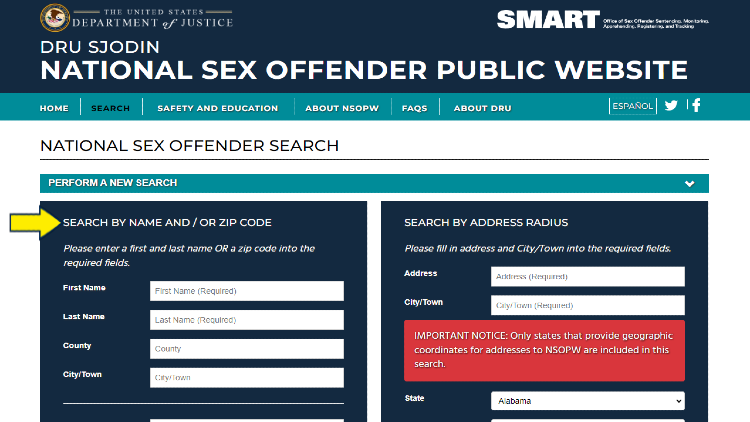
National Sex Offender searches are a common part of every employment background check, but will not show dismissed charges.
They are also able to look at various criminal registries, such as sex offender registries, to guide their hiring decision, as well as police databases which tend to track slightly more information than court records do.3
When it comes to what information they can actually use, the U.S. The Equal Employment Opportunity Commission only requires that employers use fact-based information.5 This essentially means any information that is supplied by an official agency can be used.
Employers must also abide by the rules of the FCRA which means they must obtain written consent from the individual to perform the background check at all.
They are not allowed to use information regarding arrests that did not lead to convictions that are older than 7 years, and they must provide notice to the individual of what specific information on the criminal history check led to the individual being disqualified.
What Can Employers Consider for Employment Checks Under State Law? Can You Be Denied Employment for Dismissed Charges?
When it comes to what employers are able to consider under state law for employment checks, the laws will vary from state to state but in general, things will be stricter.
All states are required to adhere to federal law outlined by both the FCRA and the EEOC but are also able to adopt stricter laws as well.7, 4
Several states have adopted laws aimed at limiting discrimination against individuals who have dismissed charges on their criminal history report, however in most states, employers are still allowed to consider this information.
There are also 10-year states, that have adopted laws that prohibit employers from examining criminal history information that is older than 7 – 10 years at all during the hiring process.
A common concern for many individuals is that they will be denied employment due to their criminal history, but in an effort to avoid a discrimination lawsuit, the employer will simply lie and say the individual was denied employment because they are not qualified. This is unfortunately a somewhat common occurrence and is the main reason that more and more states are adopting ban-the-box laws, such as the Colorado Chance to Compete Act.1
This prohibits employers from asking about criminal history until they have determined the individual meets the qualifications for the job.
Where Can You Go To File Complaints About Hiring Decisions?
Since so many people aren’t fully aware of their rights when it comes to applying for jobs and undergoing background checks, unscrupulous companies may take advantage of this and freely discriminate against individuals.
Those who have found themselves in this situation should know where to go to file a discrimination or unfair hiring practices complaint.
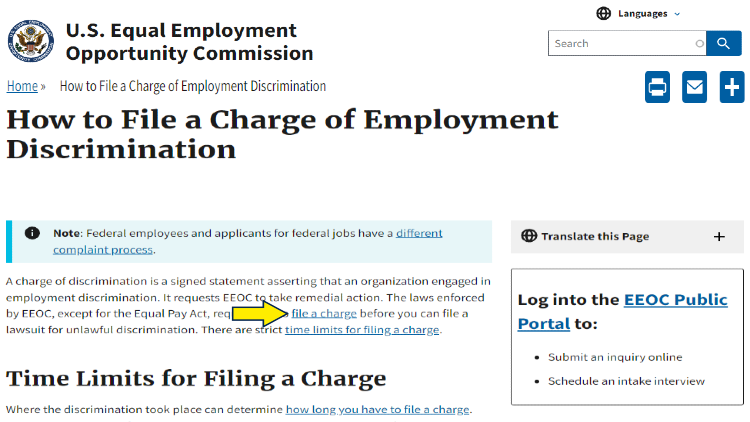
The U.S. Equal Employment Opportunity Commission provides links to filing a formal complaint about a company’s hiring practice, as well as how long a person has to file the complaint after being denied employment.
The best way to do so is to file a charge of employment discrimination with the EEOC on their website.6
Overview of Anti-Discrimination Laws
Anti-discrimination laws are fairly complicated, however, individuals can find a thorough overview of anti-discrimination laws with the Equal Employment Opportunity Commission which outlines all of the major anti-discrimination laws.8
Do Dismissed Charges Show Up on a Background Check?
Although many people will be surprised, when it comes to do dismissed charges appear on a background check, the answer is yes. For pre-employment background screening what shows up, most background checks will involve entering the individual’s name into national, state, and local court databases in some way.
When this happens, any court documents pertaining to the individual will be made available, including court documents showing charges were filed. This means employers will be able to find any charges that were filed at all as even those that were dismissed for various reasons will still be present.
However, when it comes to charges that did not result in a conviction, the employer will be able to see that no judgment was reached on the charges. Keep in mind that this is a fairly common outcome and many cases that are charged are eventually dropped due to lack of evidence.
Individuals in a situation where they have been charged with a crime for which there is little evidence should know the signs their case will be dismissed.
What If You’re Arrested But Not Convicted
Being arrested but not convicted of a crime is extremely common, unfortunately how it will impact employment opportunities can be difficult to determine exactly.
However, it is important to know that most employers will not consider non-conviction information, even if they are technically allowed to.
Will Dismissed Cases Hurt Job Chances? Can You Pass a Background Check With a Dismissed Misdemeanor?
The biggest concern for those with dismissed charges on their record is will dismissed cases hurt job chances, and they can but the impact tends to be fairly minimal. As mentioned, employers will be able to see the details of the dropped charges as well as the fact that the charges did not result in a conviction for the alleged crime.

(Image: cottonbro studio10)
Although it can play a factor, most employers will not look too closely at non-conviction information and in many cases will simply ignore this information entirely.
If an employer does use this information as means to deny employment, then they are required by the FCRA to provide the specific reason that employment was denied. When it comes to how you know if you failed an employer background screening, they are legally required to contact the individual with the results of the criminal history check, if this was a factor in the decision.
Charge vs Conviction Background Check
Some people will have heard about different criminal history checks and will be confused about a charge vs conviction background check. Although some employers might look at conviction information exclusively, there isn’t really a conviction background check.
Most employers will hire private companies to perform criminal history checks for them. As mentioned this is done by examining any court records that match the name of the individual.
This court records search does not discriminate what kind of records it will uncover, and the background check report will contain all of the court documents relating to the individual including dismissed charges and conviction information.
Basically, charges and convictions will almost always be present in a criminal history check.
Can Dismissed Charges Eliminate Applicants for Federal Employment?
When it comes to, can dismissed charges eliminate applicants for federal employment, the answer is even more complicated. Federal background check practices are notoriously intensive and will include more checks than a typical pre-employment check with a private employer.
The reason for this is fairly simple: private employers are concerned with financial liabilities whereas federal background checks are most concerned with issues involving national security, resulting in more thorough checks.
This means that federal employment background screening disqualifiers are somewhat different from private employers. Not only is more information able to be used but charges that did not result in a conviction will also be under much more scrutiny.
Whether or not it actually affects the employment opportunity will depend on the exact position but the bottom line is that there is a much stronger possibility for a dismissed charge to impact a federal job background check.
Will a Dismissed Misdemeanor Affect Employment?
When it comes to the odds of a dismissed charge affecting employment, it will usually follow the same rule as the impact of convictions: the more serious the crime, the more likely it is to have an impact.
When it comes to, will a dismissed misdemeanor affects employment, the odds of this are fairly low. Not only are misdemeanor convictions unlikely to affect employment, unless they involve violent crimes or sex crimes, but dismissed charges are usually not a major factor in hiring decisions.
Keep in mind that this mostly applies to jobs with private employers and government jobs tend to have stricter hiring policies.
Many people will be asked about their criminal record on job applications and will be wondering if charges are dismissed do they have a criminal record, and the answer is usually no. However, some job applications will ask individuals if they have ever been arrested or charged with a crime. In this case, people with dismissed charges should answer ‘yes’.
As far as misdemeanors that prevent employment are concerned, only those that are directly related to the job, or are violent in nature will stand out as red flags on a background check.
So, can you pass a background screening with a dismissed misdemeanor? In most cases, a dismissed charge of any kind will not impact employment and dismissed misdemeanors are especially unlikely to play a role.
However, regarding the question of whether a misdemeanor will affect employment, disqualification due to misdemeanor convictions is much more common.
Will a Dismissed Felony Affect Employment?
Although most employers are not too concerned with misdemeanors in regards to, will a dismissed felony affects employment, the answer might be more frustrating. Generally, felonies of any kind on a background check, whether they are convictions or just charges, will be looked at much more closely.
Remember, denying employment based on a dismissed charge can be a tricky legal situation for a company, but when the dismissed charges are fairly serious such as dismissed felony charges for violent or sex crimes, the employer might be more willing to take the risk of being sued to protect their company and employees.
Can You Be Denied Employment for Dismissed Charges?
So, can you be denied employment for dismissed charges? Although legally the answer is yes, the reality is that this is a fairly rare occurrence.
There is a ton to consider, and even with all the facts about local and state laws and information on the companies hiring practices, individuals will still likely be taking an educated guess when it comes to the impact of a dismissed charge.
Every company is different but individuals can protect themselves by being aware of laws like, how far back a background screening goes for employment, as well as knowing the basic process to recognize discrimination and how to file a complaint for discrimination.
Although the way companies view dropped charges is largely outside of the control of the applicant it is important to take advantage of everything that is in control of the applicant. Individuals should take the following basic steps to increase their chances.
Learn About State and Local Hiring Laws
It’s important to familiarize yourself with the local hiring and background check laws. More counties are adopting laws at the local level to help protect applicants from discrimination and unfair hiring practices.
By knowing these ahead of time, individuals can recognize when an employer is violating these rights.
Run a Background Check on Yourself
Running a background check on yourself is extremely easy and can help individuals identify any mistakes on their background check. Individuals can use the search bar at the top of this page to perform a check on themselves.
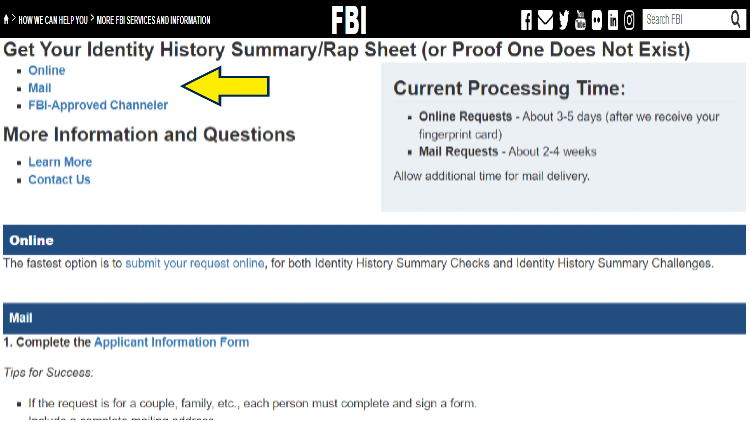
Checking your own criminal records can be done using the FBI’s Identity History Summary request process, which can illuminate any incorrect data entries or conviction status.
There is also the option to get a more thorough federal background check through the FBI.2
Be Honest With the Employer
It’s always in your best interest, to be honest about your criminal history with an employer. Having a criminal history might impact the ability to pass a background check, but lying about your criminal history will certainly impact the background check.
Knowing what to expect from a background check is extremely important, no matter what the job is or what the individual’s criminal history looks like. Individuals should always be aware of the employment laws that are aimed at protecting applicants from discrimination and other unfair hiring practices.
When asking can you be denied employment for dismissed charges, the answer is technical yes, but most employers will not consider this information for legal reasons.
Frequently Asked Questions About Can You Be Denied Employment for Dismissed Charges








